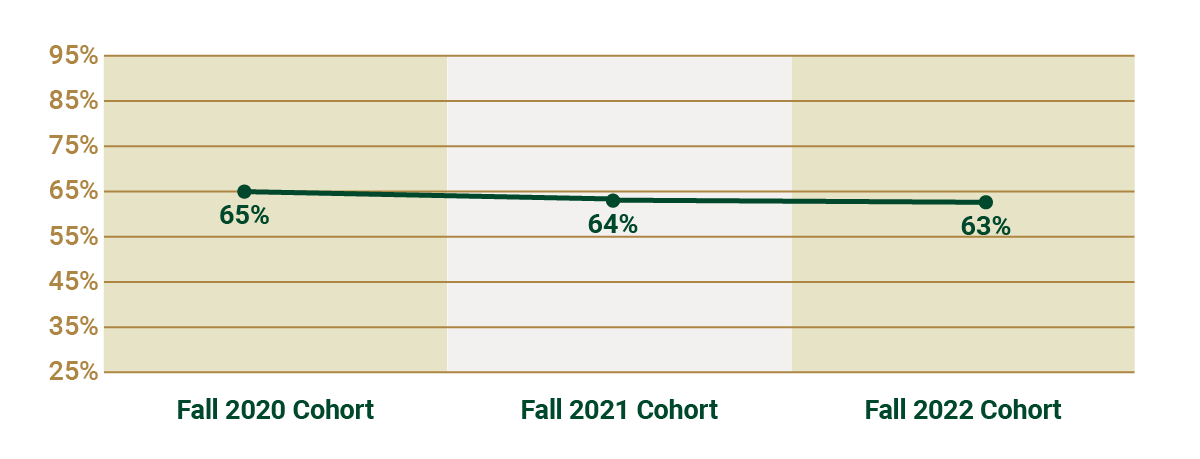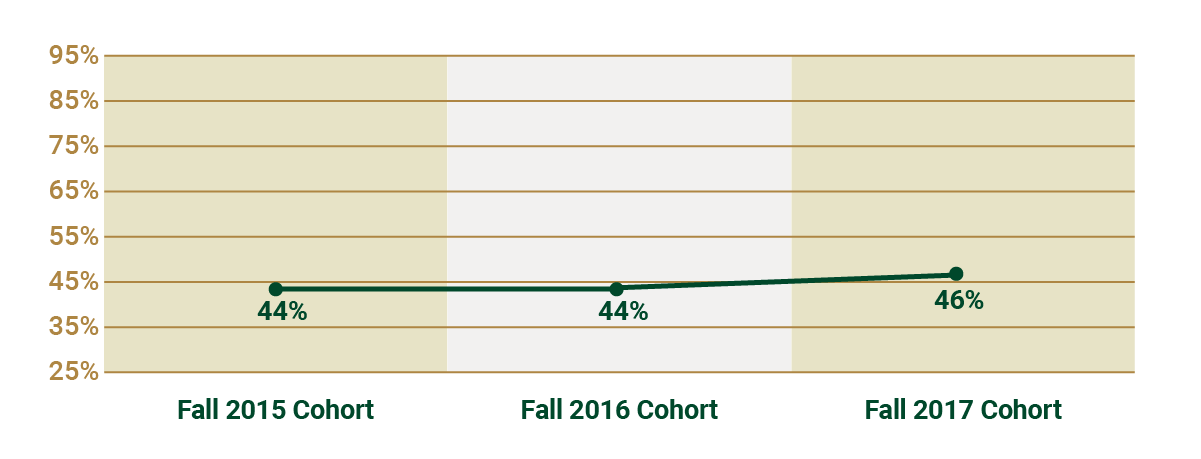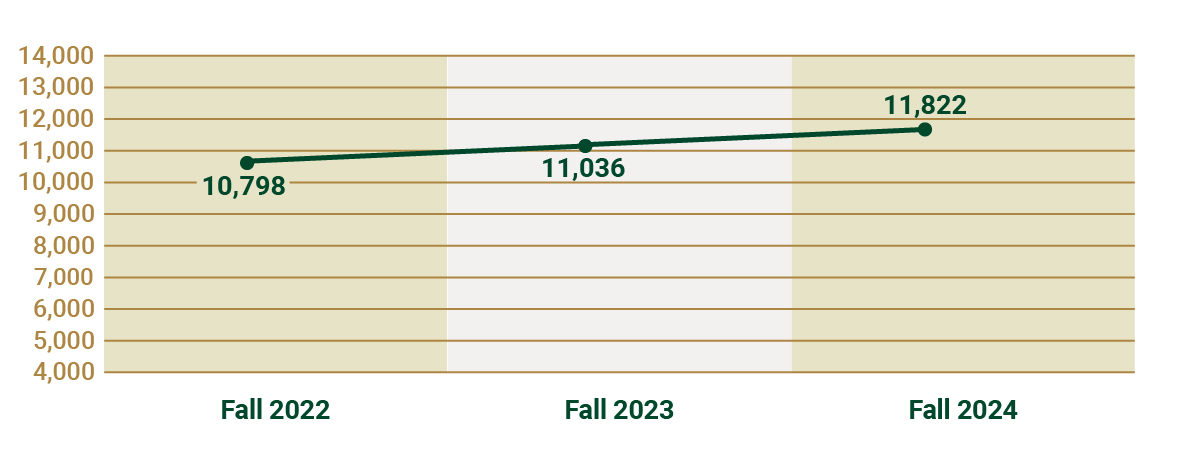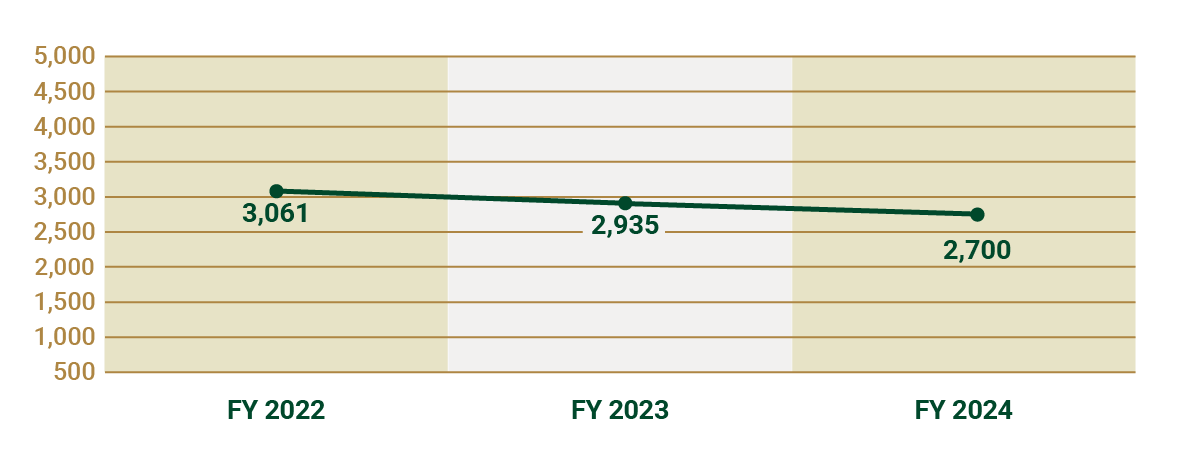Measuring Success: Objective 1 Student Success—Transformational Student Experience
Bridge Strategic Plan 2023–2025

On this page:
- Objective 1: Student Success—Transformational Student Experience
- Strategy 1: Implement student-centered best practices and ensure institutional policies prioritize students
- Strategy 2: Create and maintain transformational and relevant academic programs to meet the needs of the region and beyond
- Strategy 3: Increase community engagement, co-curricular, and experiential learning opportunities
- Strategy 4: Improve student success and retention rates
- Key Metric: First-Year Retention Rate
- Key Metric: Six-Year Graduation Rate
- Key Metric: Total Enrollment
- Key Metric: Completions
Objective 1: Student Success—Transformational Student Experience
Higher education is a primary driver of social mobility and civic engagement. Wright State prides itself on providing access to high-quality educational experiences to students from all backgrounds, meeting each student where they are and helping them build the knowledge, skills, and experiences to achieve life goals.
We will achieve this objective through the following strategies.
Strategy 1: Implement student-centered best practices and ensure institutional policies prioritize students
april 1, 2025 updates:
- Improvements were made to the intervention course for students on academic probation, including targeted enrollment campaigns, and data-driven interventions built into the course curriculum. Spring 2025 enrollment in the course increased 104% from the prior year and participating students saw a 33% increase in mid-term passing rates.
- The university launched a bachelor’s degree completion initiative, targeting students stopped out in the prior two years but had earned more than 90 credit hours. Academic advisors reviewed cases to determine fit for the new Interdisciplinary bachelor’s degree that allows more flexibility in degree concentrations and offers online courses that would support stopped out students’ needs to often complete their degree online. Outreach to these students began in Spring 2025 and several have already met with an advisor to re-enroll in Summer 2025 and Fall 2025 to complete their degree.
- The university transitioned its student employment application process from Handshake to the university’s applicant tracking system, PeopleAdmin. This allows for an application and onboarding experience that is more seamless and aligned with the expectations that they will ultimately encounter when they seek full-time professional work.
January 1, 2025 updates:
- The university conducted an associate's degree outreach campaign, contacting students who had stopped out prior to earning their bachelor's degree, but met the requirements to earn an associate's degree. While not the intended bachelor’s degree credential, this would still provide the opportunity to have a college-level credential. While not the intended bachelor’s degree credential, this still provides the opportunity to have a college-level credential. Nearly 50 of the contacted students were awarded their associate's at the Fall 2024 commencement and others remain eligible to apply for graduation in future terms.
October 1, 2024 updates:
- The University Policy Committee sent revisions for the Maximum Credit Hour Policy, Course Repeat Policy, and Academic Standing Policy to the Faculty Senate for review. The Academic Standing policy updates will shift the university to a more student-centric approach, applyig suspension rather than dismissal, automating assignment of academic standing rather than relying on case-by-case review, and creating a standardized deficiency point model for dismissal based on modeling student outcomes and success rates.
April 1, 2024 updates:
- The full Fall 2023 application cycle was built in the university's new Slate CRM at both the undergraduate and graduate levels, streamlining many components of the application process in one central location. Students are now provided real-time access to their application, admission decision, and next steps via an individualized student portal. Slate now also houses students’ next steps, including Orientation registration, housing information, and a link to academic advising from a central location that is familiar and specific to the student.
January 1, 2024 updates:
- Wright State employed a student-centric design process to transform its Dayton Campus over the summer and fall terms. Numerous campus services, centers, community spaces, and academic programs were located to improve access and promote student engagement. Relocations and renovations included Enrollment Services, Career Services, Student Involvement and Leadership, the Cultural and Identity Centers, University Center for International Education, College of Health, Education and Human Services, College of Liberal Arts, College of Graduate Programs and Honors Studies, Collegiate eSports Club, and Raider Landing.
October 1, 2023 updates:
- Wright State implemented digital tracking of student attendance at visits and events both on-campus and at external sites. Efficiency and accuracy of data capture has improved significantly over previous manual and paper-based approaches and is facilitating enhanced, customized engagement with students and parents.
- New, automated application review processes continue to improve the student application experience while reducing manual work and generating efficiencies for the university.
July 1, 2023 updates:
- The University developed and launched the Exceptional Service Workshop to instill a culture and practice of service that supports student success. The workshop was piloted with key student-facing offices in May 2023 and will be offered to all staff on an ongoing basis.
- The University launched its new CRM June 2023, opening visits and applications to prospective students and their families. The new platform simplifies the user experience and enables personalized interactions with students and parents.
April 1, 2023 updates:
- Wright State is in the process of implementing a new CRM tailor-made for higher education. The transition includes business process analysis to simplify and improve student user experience, while also streamlining processes and increasing efficiencies. The new CRM, Slate, is expected to go live in Summer 2023 and will impact Undergraduate and Graduate admissions in year one.
- A Working Policy Group, comprised of representatives from Academic Affairs and Enrollment Management, convenes monthly to review and suggest changes to policies that are noted to be out-of-date or present hurdles to student enrollment and persistence. The group considers best practices and institutional processes and then makes recommendations to each policy after consulting with departmental and functional leads. To date, the group has conducted assessments and suggested changes to policies regarding: Latin Honors, withdrawal from the University, the Wright Path program, transfer admissions, test-optional admissions, international admissions. The group will send the changes worked upon throughout the Spring 2023 semester to the University Policy Committee for consideration.
Strategy 2: Create and maintain transformational and relevant academic programs to meet the needs of the region and beyond
April 1, 2024 updates:
- A successful collaboration with Sinclair Community College resulted in the development of a new Engineering Technology degree which will welcome its first cohort of students in Fall 2025. The Engineering Technology program will allow Wright State to attract associate degree holders from Sinclair Community College and the Community College of the Air Force, two premier partners with large numbers of non-traditional students.
- This spring, the Career Hub was received approval to offer a new Career Ready microcredential that will be available to students beginning in Fall 2025.
- A collaboration with Parchment and the Marketing and Registrar teams will now enable badging of microcredentials that students can retrieve, post on LinkedIn, and utilize as they search for jobs.
January 1, 2025 updates:
- Academic colleges developed academic master plans and engaged in follow on planning exercises stemming from the Academic Efficiency and Effectiveness review.
- A new minor in Business AI was approved and a Business AI microcredential is the approval process.
April 1, 2024 updates:
- The Academic Efficiency and Effectiveness review was completed and included recommendations to discontinue 34 low-demand programs. This process allows the university to redirect its resources and efforts to improve, maintain, and expand programs that have shown significant demand and relevance in today's job market. The review process also defined metrics for future program proposals and modifications.
January 1, 2024 updates:
- Quality Matters and Course Design trainings are now regularly offered through the Center for Faculty Excellence. Faculty proposing to develop online courses are required to complete one of these trainings prior to engaging with the WSU Online instructional design team to ensure highest quality course development.
October 1, 2023 updates:
- The university began an Academic Efficiency and Effectiveness Review to ensure relevant academic programs are offered and meet the needs of the region and beyond. Initial work has involved generating quantitative and qualitative data to support the review process, forming review teams, and developing a program review schedule commencing in October 2023.
- The university has 20 microcredential programs working through review and approval processes.
- The university has approved eight combined programs over the past academic year with two additional in the pipeline. These programs allow undergraduate students to earn both graduate credit for the linked masters degree program while completing their undergraduate program.
July 1, 2023 updates:
- The university approved its first two microcredentials: Six Sigma Green Belt and Introduction to UX and Design Thinking. Both will be available beginning Fall 2023.
April 1, 2023 updates:
- Wright State introduced new institutional policies on undergraduate and graduate microcredentials, laying the groundwork to award career-focused credentials that enhance students’ workforce competitiveness.
Strategy 3: Increase community engagement, co-curricular, and experiential learning opportunities
April 1, 2025 updates:
- A renovated and modernized Career Center opened in its new location in the Student Union. The new space offers opportunities to connect with career counselors on career interests and job search preparation, engage in career-focused programming, and obtain professional headshots. Since opening in January, the center has hosted 33 events including workshops and employer engagement opportunities.
January 1, 2025 updates:
- The Center for Health Professions saw significant student engagement in its first year, up 593% since its first term. This includes exposure to experiential learning opportunities, community engagement, networking with health professionals in a variety of fields, and community building to support pre-health students on their path to the health professions
October 1, 2024 updates:
- Wright State opened its Center for Health Professions to provide resources for students navigating education and career preparation in health professions.
- Wright State launched the Medical Scholars program for top-performing high school students, providing a pathway to early interview for admission to the Boonshoft School of Medicine. The program also provides enhancements and co-curricular experiences throughout the students undergraduate program to prepare the for successful transition to medical school.
July 1, 2024 updates:
- Wright State announced the opening of its Health Professions Center and the launch of the Medical Scholars program for Fall 2024.
January 1, 2024 updates:
- As part of the Five to Finish initiative, academic colleges completed an inventory of courses that align with curricular designations and high-impact practices. This initial step enables improved transparency and planning for students and institutional tracking and analysis tools for continued improvements and opportunities for students.
July 1, 2023 updates:
- An inventory and tracking system for experiential learning opportunities was developed to improve the university’s ability to ensure students have access to high-quality learning experiences relevant to their programs and areas of interest.
April 1, 2023 updates:
- Wright State introduced a new structure for the Assurance of Learning Committee and the Co-Curricular Assessment Committee. These two large committees will become one smaller committee and work both on assessment and co-curricular assessment. April 2022 we will begin to lay groundwork for assessment planning. Two additional meetings will be held April, and the HLC team will occur on April 24th. Further planning and communications will take place over the summer of 2023, with execution of new assessment in the fall of 2023. The University will execute an implement its first module contract with Watermark by Fall 2023, with other modules to follow.
Strategy 4: Improve student success and retention rates
april 1, 2025 updates:
- The university launched new retention strategies including collaborative student holds review with campus partners, proactive holds resolution outreach to students, a weekly registration communication campaign, drop-in availability and events for advising, and affinity-based outreach to students who remained unregistered after the Spring term. These new efforts culminated in a 5.5% first-year retention increase on the Dayton campus from the Fall 2022 cohort to the Fall 2023 cohort.
- The university developed a new summer bridge program, Soaring to Success, to be launched in Summer 2025. The program will target students who are placed in a developmental level of English readiness including reading and writing skillsets. By offering the college-level English course and the developmental support course in the Summer students will be able to close the readiness gap prior to beginning their career at Wright State in the fall.
january 1, 2025 updates:
- Increased student engagement in academic support services by 54% from Fall 2023 to Fall 2024 providing tutoring and supplemental instruction to more than an additional 1000 student appointments supporting their academic success.
- Realized significant reductions in DFW rates for three course that completed the course design process.
- As part of the redesign of the academic probation process, the UVC 1000 Academic Probation course will run in Spring 2025 with an in-person course option for students most at-risk of not being academically successful.
- Success Coaches increased their student engagement by 181% from Fall 2023 to Fall 2024 and began new outreach campaigns including communications to students who withdrew from courses during the term to support their successful return in a future semester and a weekly outreach targeting at-risk student groups to offer intrusive success coaching.
- RSCOB signed an agreement with INTEL providing us access to their library of AI classroom materials and available to the University.
october 1, 2024 updates:
- First Year Seminars were launched wit h 49% of the incoming Freshman cohort enrolled and courses in every college.The courses combined student success and college-specific content to integrate the student with the university and their specific college/major-home. Ongoing training and a learning community for faculty instructors serve as a mechanism for faculty professional development and embedded assessment of the course; other assessments are planned at the end of the fall term.
- Coordinated efforts for retention, relational-based communication, and proactive removal of barriers to student success resulted in a 5.6% increase in retention rate from the Fall 2022 cohort to the Fall 2023 cohort.
- The redesign of the academic support model for students accessing tutoring, peer coaching, and supplemental instruction was launched in Fall 2024. In the first month of implementation, the number of Supplemental Instruction sessions and Peer Academic Coaching appointments doubled from last year in a month to month comparison.
- Course redesign commenced for Chemistry and Anatomy courses in a collaborative effort between College of Science and Mathematics, Student Success, and Lake Campus to integrate pedagogy and best practices with course content.
July 1, 2024 updates:
- A coordinated cohort retention committee was formed including Advising, Financial Aid, Registrar, Enrollment, Provost’s Office, and Institutional Research. Early this year, the group began meeting monthly to identify barriers to registration/enrollment and develop outreach and support campaigns and operations.
- The First Year Seminar course underwent a redesign process aimed at improving outcomes and retention rates for first year students. The revised course will be piloted Fall 2024 for 30% of incoming students and will be required as part of the Wright State Core beginning Fall 2025.
April 1, 2024 updates:
- An updated general core curriculum was approved spring 2024 semester, and will require a 3-credit hour First Year Seminar (FYS) for students beginning Fall 2025. Colleges have scheduled initial FYSs to begin Fall 2024 with expected enrollments of 700+ students across 27 sections and 6 colleges.
- Success Coaches in the Office of Orientation and Success Programs routinely engaging with the Take Flight cohort to check on their general well-being, determine how the semester is going, and encourage them to register for Fall 2024. Success coaches closely monitor registration status and engage in multiple modes of communication to support successful registration efforts.
July 1, 2023 updates:
- University departments collaborated to update data used to determine and define retention, enabling a common language consistent reporting data for analysis and strategy development. Adoption of this definition enables all areas to focus on students within the retention cohort and will illuminate areas necessary to focus on; equity gaps that exist within first-year students, implementation of subsequent data as it relates to students not returning, mitigating barriers to student success.
April 1, 2023 updates:
- Wright State introduced a university-wide student retention committee and college retention committees. College committees have identified "difficult courses" for intervention. First Year Experience is part of the student retention committee. The College of Liberal Arts is piloting 8 sections of program-led first-year seminars. A College Writing Workshop will be provided to students in week zero. The committees are also planning for additional coordination of other week zero activities with Student Affairs.
- In an effort to increase retention rates and degree completion, Enrollment Management has recently partnered with Graduation Alliance, a company who focuses on “registration recovery” efforts. Beginning in April 2023, Graduation Alliance will contact students who were registered in Fall 2022 but did not attend in Spring 2023. This outreach will focus on all undergraduate and graduate students who are in good standing with the University. Beginning in July 2023, the organization will conduct the same type of outreach to students who attended in Spring 2023 but have not yet registered for Fall 2023.
- Beginning in Fall 2023, the newly created Office of Orientation & Success Programs will focus its efforts on increasing the retention of targeted student populations, such as first generation, Pell eligible, and those attending underserved high schools. These efforts will focus on providing students with the tools and connections to successfully transition to Wright State and further thrive in a university setting. In addition to creating UVC 1010 courses to intentionally convene groups of students and introduce them to key and critical topics, the Success Coaches will serve as mentors to these groups of students and develop programming that provides access to and awareness of key campus influencers and opportunities, all while creating a sense of community and increasing student belonging.
Key Metric: user check First-Year Retention Rate
An inclusive environment enriches the educational experience for all students but requires intentional support structures for those who may require more assistance to reach their academic goals. At Wright State, we aim to provide both access and success to advance the social mobility of our region.
First-year retention rates are an important indicator that students are overcoming the challenges of transitioning to college and progressing toward degree completion.
Data definition: The percentage of Dayton Campus first-time, full-time baccalaureate degree-seeking freshmen who are retained from the first fall term to the next consecutive fall term. IPEDS Retention Rate Survey.

| Metric | Fall 2020 Cohort | Fall 2021 Cohort | Fall 2022 Cohort |
|---|---|---|---|
| First-Year Retention Rate | 65% | 64% | 63% |
Key Metric: graduation cap Six-Year Graduation Rate
Most Wright State University students arrive on our campuses with the goal of attaining a degree or credential to enhance their personal, professional, and economic outcomes. As the “traditional” college student has shifted over the years, so too have the challenges they face. Our faculty and staff are dedicated to working with students to keep them on track to timely degree completion.
Graduation rate is an important indicator of our effectiveness in supporting Wright State students to the finish line.
Data definition: Six-year graduation rates of Dayton Campus Fall cohort full-time, first-time, bachelor's-seeking (undergraduate) students who attained a bachelor's degree. IPEDS Graduation Rate Survey.

| Metric | Fall 2015 Cohort | Fall 2016 Cohort | Fall 2017 Cohort |
|---|---|---|---|
| Six-Year Graduation Rate | 44% | 44% | 46% |
Key Metric: user plus Total Enrollment
Degree attainment is a key driver of social mobility and is vital to producing a highly-skilled workforce and engaged citizenship for our region and state. Wright State is committed to providing high-quality, affordable, accessible educational programs.
Total enrollment signals our success in attracting students who want to begin, continue, or return to post-secondary education.
Data definition: Total, unduplicated Fall term headcount enrollment for all campuses.

| Metric | Fall 2022 | Fall 2023 | Fall 2024 |
|---|---|---|---|
| Total Enrollment | 10,798 | 11,036 | 11,822 |
Key Metric: check Completions
Life-long learning is core value of higher education, but is also critical to the advancement of our global society. Wright State University is proud to offer high-quality, relevant undergraduate, graduate, professional, and certificate programs for learners at all stages of their educational and professional careers.
Completions are evidence of our success in producing highly-prepared graduates at all degree levels.
Data definition: Total degrees and certificates conferred within the academic year at the associates, baccalaureate, graduate, and professional levels.

| Metric | FY 2022 | FY 2023 | FY 2024 |
|---|---|---|---|
| Completions | 3,061 | 2,935 | 2,700 |

